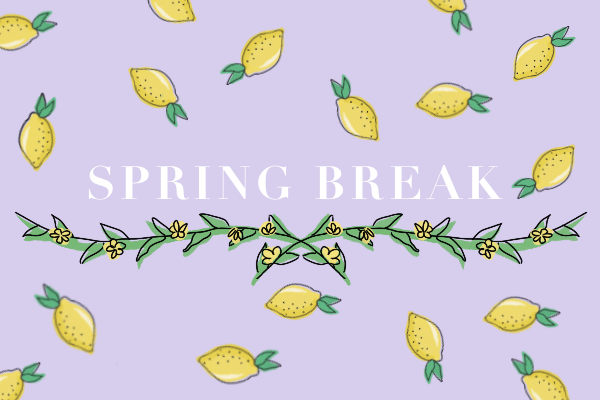 Most University of Cincinnati Libraries locations have reduced hours for Spring Break, March 12-20. Check the library website for a list of hours by location.
Most University of Cincinnati Libraries locations have reduced hours for Spring Break, March 12-20. Check the library website for a list of hours by location.
Have a safe and relaxing Spring Break, Bearcats!

 Most University of Cincinnati Libraries locations have reduced hours for Spring Break, March 12-20. Check the library website for a list of hours by location.
Most University of Cincinnati Libraries locations have reduced hours for Spring Break, March 12-20. Check the library website for a list of hours by location.
Have a safe and relaxing Spring Break, Bearcats!
The Oesper Collections and Museum in the History of Chemistry at the University of Cincinnati is pleased to present a new blog series, Oesper Collection Highlights. We will feature items from our amazing collections of rare books, prints and portraits, and online collections that inspire and educate all. We thank our student intern, Brenna Kobes, for researching and preparing these posts. If you have questions about the Oesper Collections and Museum, please contact Ted Baldwin, Ted.Baldwin@uc.edu, Director of the UC Science and Engineering Libraries.
Oesper Collection Highlights for March 2022 recognize Women’s History Month and the contributions of women to chemistry over the centuries. We aim to raise awareness and celebration for their accomplishments.
Continue reading
The Oesper Museum & Collections in the History of Chemistry (502 Rieveschl Hall, University of Cincinnati’s main campus) invites you to a celebration and open house starting at 7:00pm on Tuesday, March 15. The Museum & Collections will be designated as a National Historical Chemical Landmark by the American Chemical Society (ACS). More event details in the invitation graphic below. Please RSVP at https://www.surveymonkey.com/r/63BJC22 and share with others. The public is welcome.
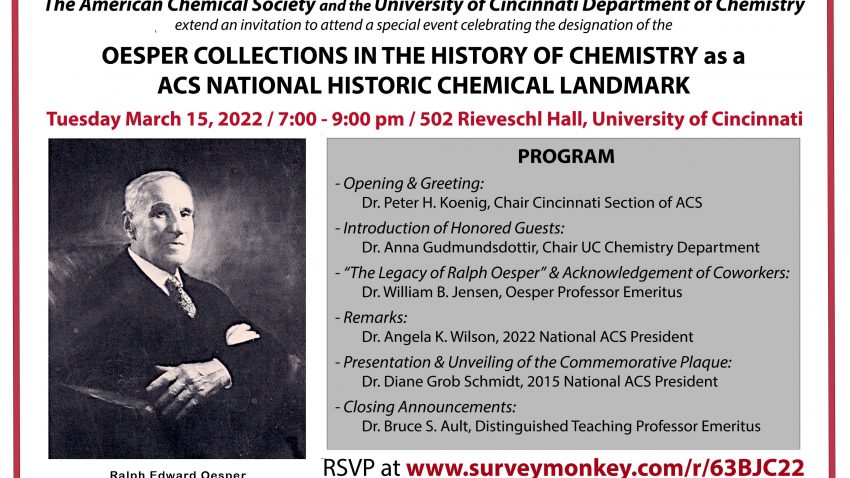
Program details for March 15 Oesper Museum celebration
The Oesper Museum & Collections are a unique and hidden treasure. They showcase and document the history of chemistry in many ways: historic chemical apparatus museum, replica 1900 chemical laboratory, prints and portraits collection, and a library/rare books collection. The Museum & Collections are a partnership of the UC Chemistry Department and UC Libraries. Read more and view virtual displays from the chemical apparatus museum: https://digital.libraries.uc.edu/oesper/museum/displays.html and https://www.cincinnatimagazine.com/citywiseblog/cincy-obscura-the-oesper-collection/ .
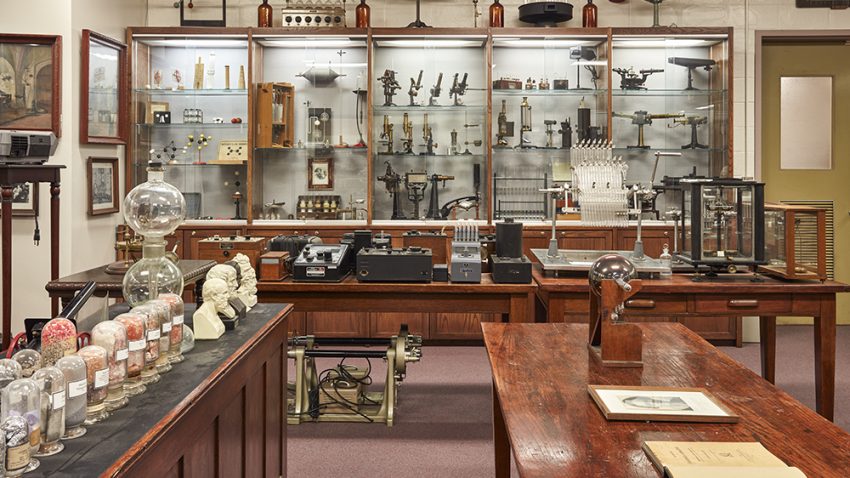
We are thrilled to welcome you to the Oesper Museum & Collections. Contact Ted Baldwin (Director, UC Science & Engineering Libraries) with questions, Ted.Baldwin@uc.edu .
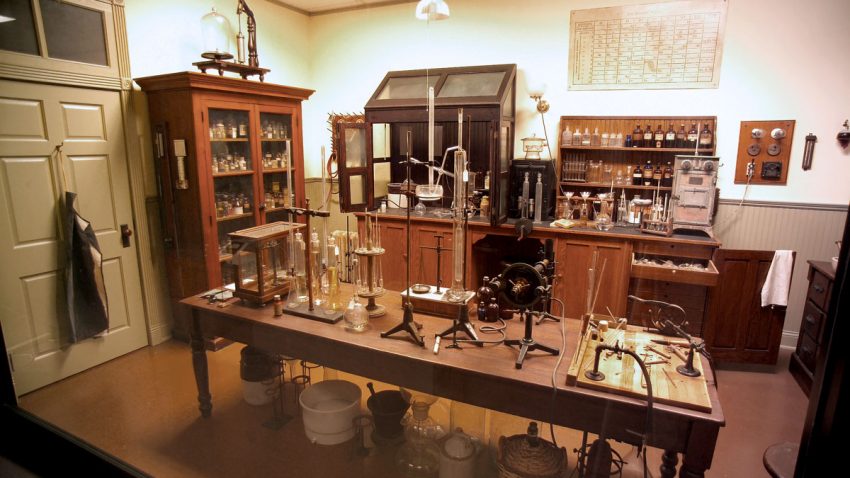
Ca. 1900 replica laboratory
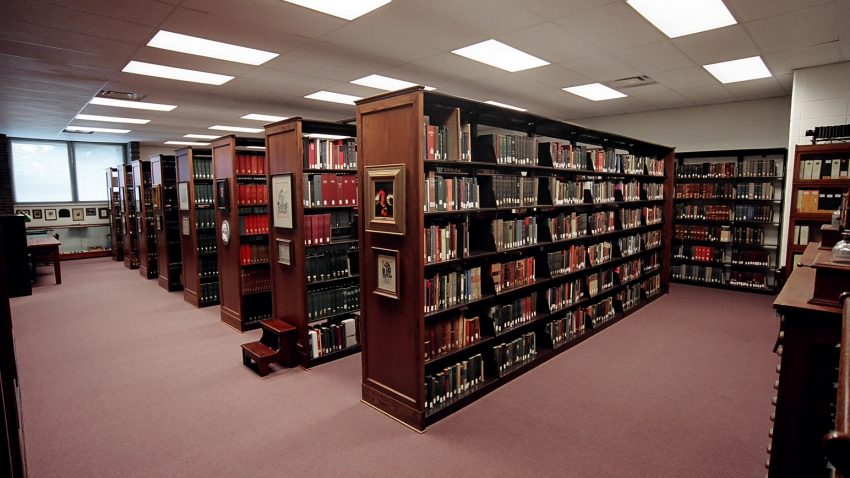
Oesper Library Collections (history of chemistry)
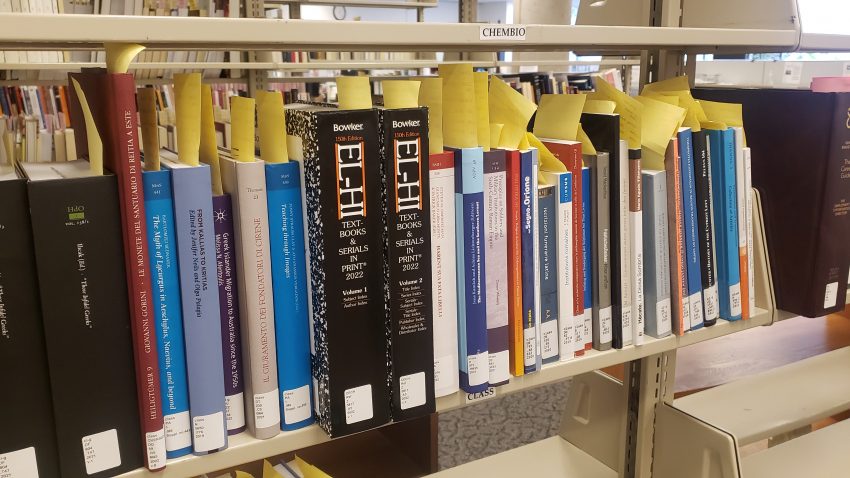 In order to address ongoing delivery issues with OhioLINK materials, the University of Cincinnati Libraries, along with the other college, university and public libraries in Ohio, is changing the OhioLINK delivery provider.
In order to address ongoing delivery issues with OhioLINK materials, the University of Cincinnati Libraries, along with the other college, university and public libraries in Ohio, is changing the OhioLINK delivery provider.
There are three important points that impact OhioLINK borrowing immediately:
Beginning April 18, we will return to working with the company that provided delivery prior to July 2021 and are confident that they will be able to deliver your library materials efficiently once again. As we transition from one company to another, however, there will be slower than usual delivery times.
We ask for patience as we implement this long-term solution.
Questions? (513) 556-1424 or https://libraries.uc.edu/about/contact.html. In addition, OhioLINK has created a FAQ.
Over the past two years, the term “zoom bombing” became prevalent in discussions about our remote work experience. Zoom bombing means a situation where unauthorized individuals gain access to a virtual meeting and cause disruption. To deal with this very disruptive practice, IT@UC made changes to the Faculty One Stop and Compliance Training systems in effect from Monday 02/21/2022.
Moving forward, meeting links will not display on the main information page for workshops. Instructors should enter the meeting URL in the “other information” section and only those individuals logged in and who register for a workshop will be able to see this section in the workshop description. This will help ensure that only UC credential holders and individuals who had an account created for them will have access to this information after registration.
For instructors – where to enter this information
For workshop registrants – where to find this information.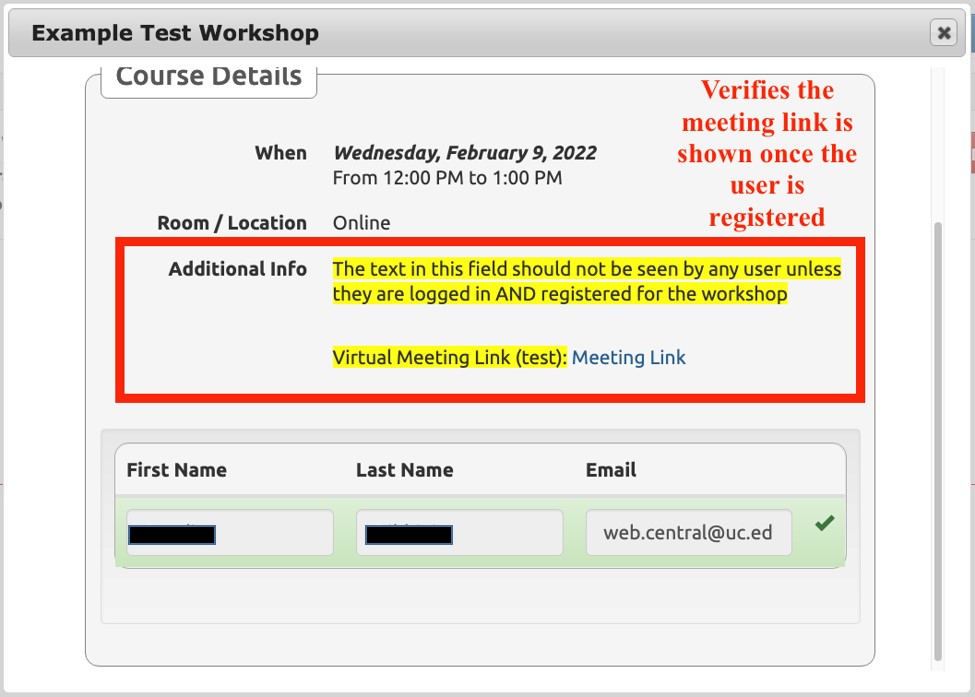
For technical support with Faculty One Stop, please call 513-558-2101 or email web.central@uc.edu
The Oesper Collections and Museum in the History of Chemistry at the University of Cincinnati is pleased to present a new blog series, Oesper Collection Highlights. We will feature items from our amazing collections of rare books, prints and portraits, and online collections that will inspire and educate all. We thank our student intern, Brenna Kobes, for researching and preparing these posts. If you have questions about the Oesper Museum, please contact Ted Baldwin, Ted.Baldwin@uc.edu, Director of the UC Science and Engineering Libraries.
Our first installments in the Oesper Collection Highlights will celebrate African-American History Month. African-American Chemists selected for these profiles were early pioneers in the field – some were the first to achieve PhDs in chemistry, whereas others made significant contributions to study and practice. Sometimes their stories and voices have not been heard. We aim to highlight and celebrate these accomplished African-American chemists who contributed across the spectrum of the chemistry discipline.
St. Elmo Brady
Born in 1884 in Louisville Kentucky, St. Elmo Brady (Fig. 1) is known as the first African  American to earn a PhD in Chemistry. In 1905 he earned his bachelor’s in science from Fisk University which he would later return in 1927 to teach chemistry and organic chemistry, a position that he kept for 25 years until his retirement. While studying as Fisk, Brady met Thomas Talley who was a professor of chemistry at the university. His teachings helped to influence Brady and encourage his further studies in the field “I do not remember Thomas Talley for the chemistry he taught me, but for the encouragement and inspiration he gave me to go on” (Martin & Martin , 2006). He then completed his Master of Arts in Chemistry at the University of Illinois. There he co-wrote three papers with Professor Clarence Derick. Brady’s master thesis was written on the Scale Influence of Substitution in Organic Electrolytes (Fig. 2). Once finished, Brady began work on his
American to earn a PhD in Chemistry. In 1905 he earned his bachelor’s in science from Fisk University which he would later return in 1927 to teach chemistry and organic chemistry, a position that he kept for 25 years until his retirement. While studying as Fisk, Brady met Thomas Talley who was a professor of chemistry at the university. His teachings helped to influence Brady and encourage his further studies in the field “I do not remember Thomas Talley for the chemistry he taught me, but for the encouragement and inspiration he gave me to go on” (Martin & Martin , 2006). He then completed his Master of Arts in Chemistry at the University of Illinois. There he co-wrote three papers with Professor Clarence Derick. Brady’s master thesis was written on the Scale Influence of Substitution in Organic Electrolytes (Fig. 2). Once finished, Brady began work on his
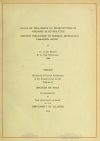
Fig. 2, MS thesis cover
Doctorate at the University of Illinois, where he worked in Noyes Laboratory. His thesis was written on the Divalent Oxygen Atom (Fig. 3).
In 1916, he accepted a position at Tuskegee University, then four years later he would move to Howard University. While at Howard, Brady became the chair of the chemistry department. Seven years later Brady would move once again, this time to Fisk University. Here he was chair of the Chemistry department and created the first graduate studies program at a black college. He
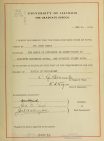
Fig. 3, PhD dissertation cover
spent 25 years here before retiring in 1952, leaving an impressive legacy behind. For all the teaching accomplishments that Brady is known for, very little is known about his published works. The works he did write were early in his career and were often co-authored with someone else. Besides his theses for both his Masters and Doctorate, the three abstracts he wrote with Professor Derick and the paper he wrote Professor Beal, the only other written work Brady did were three monographs on household chemistry for girls.
While there is a lack of published work for St Elmo Brady, it is hard to determine what could have caused this. While there is a real possibility that his work was rejected by publishers based on his race (Martin & Martin, 2006), it is also equally possible that Brady enjoyed teaching more than he did writing. Regardless of the amount of published works that Brady had, what cannot be ignored is the path he cleared for those who would follow him. Being the first at something takes courage to not only believe in yourself, but to also know that you are setting an example for so many to follow in the years to follow.
Author: Brenna Kobes (Intern, Oesper Collections in the History of Chemistry
Brady, St. Elmo (1884-1966). (n.d.). Retrieved from University of Illnois Urbana-Champaign Department of Chemistry: https://chemistry.illinois.edu/spotlight/alumni/brady-st-elmo-1884-1966
Martin, D. F., & Martin , B. B. (2006). St. Elmo Brady (1884-1966): Pioneering Black Academic Chemist. Florida Scientist, 116-123.
Noyes Laboratory at the University of Illinois. (n.d.). Retrieved from acs.org: https://www.acs.org/content/acs/en/education/whatischemistry/landmarks/noyeslaboratory.html#st-elmo-brady-biography
JOIN us for the first in a four part data visualization series entitled:
A well thought out and designed visualization can convey meaning and deep insight into vast amounts of data. In this four part lecture series, data visualization researchers and experts will discuss visualizations from different disciplines and highlight choices made to find the “so what”.
This series is a part of the Data and Computational Science Series.
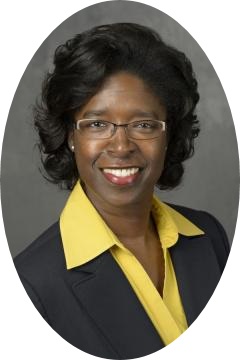 Our first speaker will be Vetria Byrd PhD Assistant Professor of Computer Graphics Technology at Purdue University. Dr. Byrd is interested in interdisciplinary research topics such as uncertainty visualization (it’s role and impact on reasoning in decision-making), big data, and high performance visualization.
Our first speaker will be Vetria Byrd PhD Assistant Professor of Computer Graphics Technology at Purdue University. Dr. Byrd is interested in interdisciplinary research topics such as uncertainty visualization (it’s role and impact on reasoning in decision-making), big data, and high performance visualization.
Title: The Role of Data Visualization in Science and Computational Science
Date: March 2, 2022
Time: 3:00 pm – 4:00 pm EST
Please register https://ce.uc.edu/FacDev/Workshops/Details/17323 for the zoom link
This free event is hosted by UC Libraries Research and Data Serivces and the Office of Research – Research Computing and Data and funded by the Office of the Provost Universal Provider Grant and is open to all.
 Do you need something new to read to start your new year? The Geology-Math-Physics and Langsam Libraries have added many new books to their shelves.
Do you need something new to read to start your new year? The Geology-Math-Physics and Langsam Libraries have added many new books to their shelves.
Click here to access the November-December 2021 list.
If you have any questions about these books, contact Ted Baldwin, Director of Science and Engineering Libraries, at Ted.Baldwin@uc.edu.
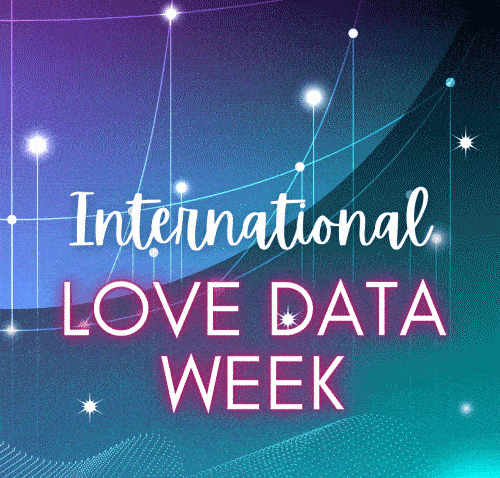
UC celebrates International Love Data Week. Feb 14-18, 2022.
UC Libraries will celebrate Love Data Week by hosting several workshops and events around campus.
Love Data Week was started to promote data use in higher education by a collection of academic librarians. It has grown into an international movement where data resources, workshops and collections are showcased during Valentine’s Day week. Learn more about its history and other events at https://myumi.ch/ICPSRldw2022events. #LoveData22
The theme this year is “Data is for Everyone.”
Sponsored by the Research and Data Services Department at UC Libraries along with Office of Research -Research Technologies-Research Computing and Data and the Graduate School, there are events daily to support researchers in every aspect of the data lifecycle from Library, Research Computing, and graduate student team members.
Featuring classes on storage and sharing (GitHub), using GIS to tell a story in a user-friendly format (Intro to Story Maps), data analysis, Introduction to XSEDE Big Data and Machine learning, organizing information (for Grad Students), protecting your own data (Consumer Data Protection), and finding data through patents (Find Patents!), this week will have something for everyone! Continue reading
This year’s Annual Progress Report covers July 2020 through June 2021. It was an exceptionally complicated time, during which we entered the second year of the pandemic, developed and adopted new digital resources to support remote learning and remote research and prepared for the transition back to campus for the 2021 fall semester.
In these unprecedented times, library faculty and staff continuously found ways to transform and elevate library services by bringing their experience, talents and dedication to the forefront so as to continue to fulfill our mission to “empower discovery, stimulate learning and inspire the creation of knowledge by connecting students, faculty, researchers and scholars to dynamic data, information and resources.” Continue reading